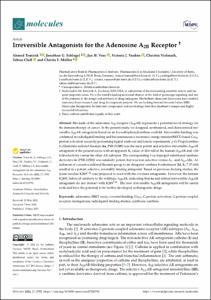Irreversible Antagonists for the Adenosine A2B Receptor

Irreversible Antagonists for the Adenosine A2B Receptor

| dc.contributor.author | Temirak, Ahmed | |
| dc.contributor.author | Schlegel, Jonathan | |
| dc.contributor.author | Voss, Jan | |
| dc.contributor.author | Vaaßen, Victoria | |
| dc.contributor.author | Vielmuth, Christin | |
| dc.contributor.author | Claff, Tobias | |
| dc.contributor.author | Müller, Christa | |
| dc.date.accessioned | 2023-04-28T12:09:13Z | |
| dc.date.available | 2023-04-28T12:09:13Z | |
| dc.date.issued | 13.06.2022 | |
| dc.identifier.uri | https://hdl.handle.net/20.500.11811/10805 | |
| dc.description.abstract | Blockade of the adenosine A2B receptor (A2BAR) represents a potential novel strategy for the immunotherapy of cancer. In the present study, we designed, synthesized, and characterized irreversible A2BAR antagonists based on an 8-p-sulfophenylxanthine scaffold. Irreversible binding was confirmed in radioligand binding and bioluminescence resonance energy transfer(BRET)-based Gα15 protein activation assays by performing ligand wash-out and kinetic experiments. p-(1-Propylxanthin-8-yl)benzene sulfonyl fluoride (6a, PSB-21500) was the most potent and selective irreversible A2BAR antagonist of the present series with an apparent Ki value of 10.6 nM at the human A2BAR and >38-fold selectivity versus the other AR subtypes. The corresponding 3-cyclopropyl-substituted xanthine derivative 6c (PSB-21502) was similarly potent, but was non-selective versus A1- and A2AARs. Attachment of a reactive sulfonyl fluoride group to an elongated xanthine 8-substituent (12, Ki 7.37 nM) resulted in a potent, selective, reversibly binding antagonist. Based on previous docking studies, the lysine residue K2697.32 was proposed to react with the covalent antagonists. However, the mutant K269L behaved similarly to the wildtype A2BAR, indicating that 6a and related irreversible A2BAR antagonists do not interact with K2697.32. The new irreversible A2BAR antagonists will be useful tools and have the potential to be further developed as therapeutic drugs. | en |
| dc.format.extent | 16 | |
| dc.language.iso | eng | |
| dc.rights | Namensnennung 4.0 International | |
| dc.rights.uri | http://creativecommons.org/licenses/by/4.0/ | |
| dc.subject | adenosine | |
| dc.subject | BRET assay | |
| dc.subject | covalent binding | |
| dc.subject | Gα15 | |
| dc.subject | G protein activation | |
| dc.subject | G protein-coupled receptor | |
| dc.subject | mutagenesis | |
| dc.subject | radioligand binding studies | |
| dc.subject | synthesis | |
| dc.subject | xanthine | |
| dc.subject | Guanine nucleotide-binding protein subunit alpha-15 | |
| dc.subject.ddc | 610 Medizin, Gesundheit | |
| dc.subject.ddc | 615 Pharmakologie, Therapeutik | |
| dc.title | Irreversible Antagonists for the Adenosine A2B Receptor | |
| dc.type | Wissenschaftlicher Artikel | |
| dc.publisher.name | MDPI | |
| dc.rights.accessRights | openAccess | |
| dcterms.bibliographicCitation.volume | 2022, vol. 27 | |
| dcterms.bibliographicCitation.issue | iss. 12 | |
| dcterms.bibliographicCitation.pagestart | 1 | |
| dcterms.bibliographicCitation.pageend | 16 | |
| dc.relation.doi | https://doi.org/10.3390/molecules27123792 | |
| dcterms.bibliographicCitation.journaltitle | Molecules | |
| ulbbn.pubtype | Zweitveröffentlichung | |
| dc.version | publishedVersion | |
| ulbbn.sponsorship.oaUnifund | OA-Förderung Universität Bonn |
Files in this item
This item appears in the following Collection(s)
-
Publikationen (4)




